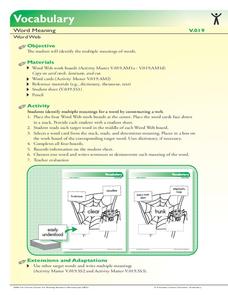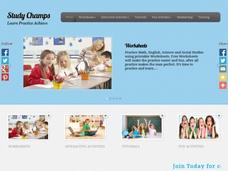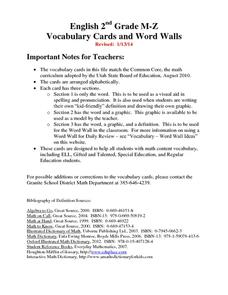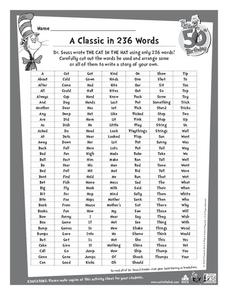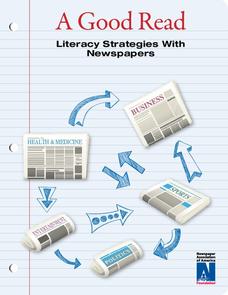DePaul University
Settlement
Early settlers in the American Midwest experienced constant struggle. This reading passage describes for young learners the hardships of homesteaders as they journeyed west and sought to start a new life. When finished, students identify...
Polk Bros Foundation
I Can Identify/Infer Motive
Why do people and characters act as they do? Require your class figure out the motivation of two people or characters they read about in a given text. In the short charts, pupils note down who, what they do, and why they do it. After...
Curated OER
Creating a Caring Culture: Appreciating the Diversity of Your School
Students explore community diversity. In this character education instructional activity, students read the book Is There Really a Human Race? discussing it with their classmates and teachers. Students design paper dolls to represent...
Curated OER
Humor: Features, Functions & Subjects
Both informative and open-ended, this presentation provides students with the features and benefits of various types of humor. The middle slides allow teachers or professors to elaborate on talking points such as the educational and...
Henry Ford Museum
You Can Be an Innovator ... Like Henry Ford
Why did Henry Ford want to invent a car for the masses? Why did Henry Ford locate his factory in Detroit? Why did Henry Ford encourage the idea of a 5-day work week? Young innovators find the answers to these and other question in a unit...
University of Texas
Alphabetic Understanding, Phonics, and Spelling
Have your youngsters reading in no time with with collection of literacy activities and lessons. Starting with a basic understanding of the alphabet, this unit progressively builds students' phonemic awareness and ability to decode and...
Meadows Center for Preventing Educational Risk, University of Texas at Austin
Lesson 2 - Consonant-Vowel-Consonant Words
Closed syllable words contain short vowel sounds. A phonics lessons introduces readers to consonant-vowel-consonant words. Guided instruction introduces the words with a series of dictation activities, and then learners practice reading...
Curated OER
Designing Experiments - Procedures for Teachers
Students evaluate a hypothetical experimental design and attempt to improve upon it. In this scientific method lesson, students are presented with an experiment and are instructed to determine its flaws. They conduct their own experiment...
Florida Center for Reading Research
Vocabulary: Word Meaning, Word Web
Explore the multiple meanings of common homographs with this fun language arts activity. Given a series of word webs and a pile of definition cards, pupils complete each web by matching four different definitions to each target word.
Texas Center for Learning Disabilities
Second-Grade Explicit Intervention
Unfortunately, not all students learn to read at the same pace, but with the help of this resource, you can ensure that they all receive the support they need to reach this important goal. Comprised of short literacy activities, these...
Florida Center for Reading Research
Comprehension: Narrative Text Structure, Character Consideration
An activity work alongside a narrative text of your choice. With reading comprehension at its focus, readers complete worksheets covering character descriptions.
Florida Center for Reading Research
Comprehension: Text Analysis, Fiction and Nonfiction Find
Scholars analyze fiction and nonfiction text and fill in a worksheet detailing the text's title, genre, and reason for its classification.
Study Champs
Emotions and Interjections
Connect emotions to grammar with a grammar exercise that taps into a little bit of creativity. Given an emotion, learners come up with a matching interjection. There are 10 emotions listed.
21 x 20 Media
A+ Writing Prompts
Shake it up! Shake your tablet to bring up a unique writing prompt for journaling or blogging with your class. Shake again and a new one appears. Prompts can come from different categories (sketches, scenes, texts, words, news) to help...
Curated OER
Vocabulary Cards 2nd Grade M-Z
Math vocabulary has never been easier to understand! Use vocabulary cards to bring word walls to your classroom, helping kids make the connection between important math terms and easy-to-understand illustrations.
Florida Center for Reading Research
Vocabulary: Word Meaning, Dictionary Digs
Young scholars dig through dictionaries to uncover the wealth of information they provide. Using the included graphic organizer, children learn about target words by finding their parts of speech, pronunciation, definition, synonyms, and...
Thoughtful Education Press
Compare and Contrast
Encourage readers to compare and contrast the information that they find in informational text with a variety of reading passages and worksheets. Learners read all about subjects in science, social studies, and literature before...
Texas Center for Learning Disabilities
Second-Grade Comprehension-Based Intervention
Help your youngsters find meaning in the text they read with this series of five intervention lessons. Offering explicit, step-by-step instructions for walking children through shared readings of leveled books, these...
American Bar Association
News Literacy Model Curriculum in Social Studies
Scholars investigate news literacy in the twenty-first century. They use technology, legal decisions, writings, and digital privacy to analyze the topic. Using what they learned, a group assignment looks into both the challenges and...
Florida Center for Reading Research
Phonological Awareness: Phoneme Blending, What's My Word?
At a listening station, learners listen to a pre-recorded script; they follow the directions and number each picture on their picture chart corresponding to the segmented phonemes they hear.
Texas Center for Learning Disabilities
Second and Third Grade Explicit Phonics Intervention
Support all young learners on their journey to literacy with this five-lesson reading intervention unit. Following a clearly outlined format, each lesson first engages children in practicing their phonemic awareness and phonics skills...
National Institute for Literacy
Making Sense of Decoding and Spelling
Go over digraphs, vowel sounds, and affixes with a series of decoding and spelling lessons. Each lesson guides learners through a different reading and phonics skill, building on the lesson before, and challenging them with each step.
Seussville
A Classic in 236 Words
Get in the reading spirit on Read Across America Day while celebrating Dr. Seuss' birthday with four printable worksheet activities. Included is a word search using story character's names, a quiz to test how many Dr. Seuss titles you've...
Newspaper Association of America
A Good Read
Teach your readers strategies for breaking down informational texts. Pupils develop and implement the tools they'll need to decode texts for the rest of their lives with an informational resource that focuses on the structure and...










